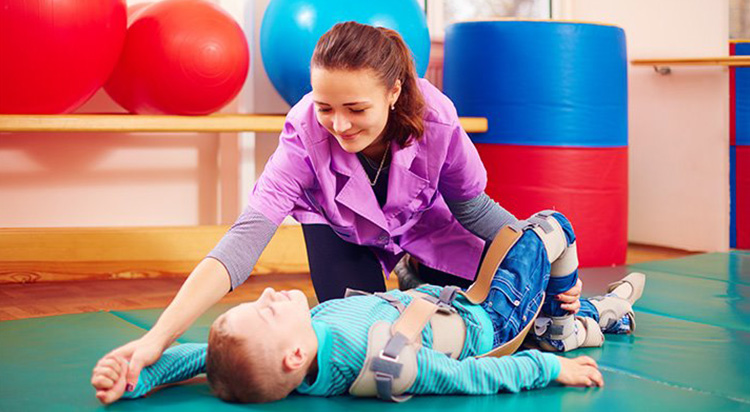Therapy
At Pediatric Caregivers, occupational, physical, and speech therapists work alongside dedicated nurses to provide a circle of compassionate care designed to help children participate in family activities, increase their independence, and move more freely within their homes and communities. We look beyond the basics to find creative ways to help families work toward achieving their children’s highest capability in eating, moving, speaking, and personal care.
We provide treatment for:
- Autism Spectrum Disorder
- ADD/ADHD
- Cerebral Palsy
- Developmental Delays
- Down Syndrome
- Feeding and Swallowing Disorders
- Neuromuscular Disorders
- Prematurity
- Seizure Disorders
- Sensory Processing Disorders
- Speech/Language Delays
- Traumatic Brain Injuries

Occupational Therapy
Occupational Therapy gets its name from the word “occupation.” Occupational Therapy helps people participate in everyday activities needed to fulfill their chosen roles (occupations). For children, an “occupation” can mean being a family member, playmate, student, or member of a community group. To be successful in these occupations, children must be able to play, manage their own self-care, participate in family activities, and attend school and community events.
Occupational Therapists (OTs) help medically fragile or developmentally delayed children achieve independence by developing self-care skills such as dressing, bathing and grooming. Children who have difficulty with joint movement, coordination, balance, sensory issues, and the use of their hands can benefit from OT. OT also addresses and treats feeding, chewing, and swallowing problems.
Children with extremely high or low responses to sensory stimulation such as touch and sound often have a very difficult time completing daily tasks due to their preoccupation with avoiding or seeking stimulation. Most children who are diagnosed on the Autism Spectrum experience sensory issues. Occupational Therapists are trained to help these children respond to sensory input in a more balanced way, so they can successfully participate in the activities of daily life.

Physical Therapy
Physical Therapy is the treatment of movement problems. Pain, muscles that are too tight or too loose, as well as limited motion, strength, and coordination can make moving difficult. Physical Therapy helps people improve and maintain function and quality of life through individual treatment plans that improve their fitness and function, avoid surgery, reduce the use of drugs, and partner in their own care.
Movement problems may also impact access to home and community environments, requiring modifications to make these areas more accessible. It may also require the use of specialized equipment that enables your child to participate in an activity rather than only passively observing it.
Physical Therapists (PTs) help children improve their ability to move from one place to another by improving the mobility of joints, and by increasing strength, balance, and coordination. PTs also evaluate the use of equipment such as wheelchairs and walkers, and of safe transfers in various settings, which enhances a child’s ability to participate in daily activities. PTs can also assist with acquiring orthotics on an as-needed basis.

Speech and Language Therapy
Speech and Language Pathology, often called Speech Therapy, helps people improve their ability to communicate through speech by assessing and treating speech and language disorders. Speech and Language Pathologists, or “SLPs,” help children to communicate by both speaking to others and understanding what is said to them.
An SLP can evaluate your child’s hearing ability, and apply the building blocks of speech and language skills in order to help your child begin to build speech. Assistive Technology is used to provide other ways to communicate when a child is unable to use his/her voice effectively. SLPs also treat children with difficulty feeding due to chewing and swallowing problems.

Infusion Therapy
Infusion therapy in your home is safe and effective. It improves the patients’ quality of life because it helps your child stay connected with familiar surroundings, family, community and supports his or her wellbeing and healing process. We provide a wide range of infusion therapies including for children of all ages who have complex medical needs. We can provide virtually any allowable infusion therapy in the home, including antibiotics, intravenous immunogloblin (IVIG), total parenteral nutrition (TPN), and more.
Our care team approach will help you make a successful transition from hospital to home-based infusion therapy. We work collaboratively with your doctor, hospital or clinic staff, case manager, and family members to ensure safe and effective home infusion therapy. From intake and insurance verification, to delivery of supplies and medications, to skilled nurse visits – you will have the care, information, training and follow-up support so that your child has optimal outcomes for infusion therapy at home.
